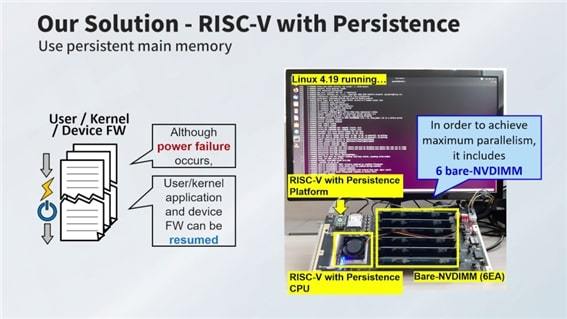S. Korea develops world’s 1st computer to save data without power
Page Info
Writer Admin Comment 0 Comment Hit 622 Hits Date 22-04-26 10:18Content
 |
Operation process of the non-volatile memory computer developed by KAIST (KAIST) |
South Korean researchers have developed a computer that can save data even after the power is turned off, facilitating ways to reduce electric power consumption, the Korea Advanced Institute of Science and Technology said Monday.
The research team led by Jung Myoung-soo, an electrical engineering professor at KAIST, has invented the Lightweight Persistence Centric System or Light PC, which can retain data regardless of power supply, according to KAIST.
KAIST said most existing computers use dynamic random access memory (DRAM) chips as the main memory storage unit. DRAM chips not only consume much more power, but lose data when the computer is shut down. In 2015, US tech firm Intel announced a product called Optane Memory, which is designed to store data when the computer is off. However, it cannot retain every piece of data because it runs too slow.
Data centers and other high-tech computers use a checkpointing technique that regularly transfers data to solid-state drives to prevent loss, but it takes extra time and energy consumption. It also requires rebooting the whole system after blackouts.
Pointing out the fatal downsides of existing technologies, the research team said by using only persistent memory processors, Light PC doesn’t need any rebooting process.
Light PC users can also enjoy high performance like DRAM in using computer programs, thanks to technology that has minimized the data processing structure and maximized parallel computing. In parallel computing, many calculations or application processes can be done simultaneously. Compared to standard computer models, computers with Light PC can have 8 times larger memory and carry out 4.3 times more applications and programs.
“Based on large computer memory and reliable services, Light PC can help data centers or other facilities that use high-tech computers meet their net zero carbon emission goals,” said Jung, adding that the computer takes up 73 percent less power than other models.
Jung added the research technology can be applied to minimize battery consumption in vehicles, mobile phones and Internet of Things as well.
In June, Jung’s team will present the Light PC research paper at the International Symposium on Computer Architecture in New York.
The research was sponsored by the Ministry of Science and ICT and the Institute for Information & Communication Technology Planning & Evaluation under the ministry. Other sponsors include the state-run National Research Foundation of Korea and a next generation memory developer called Memray.








